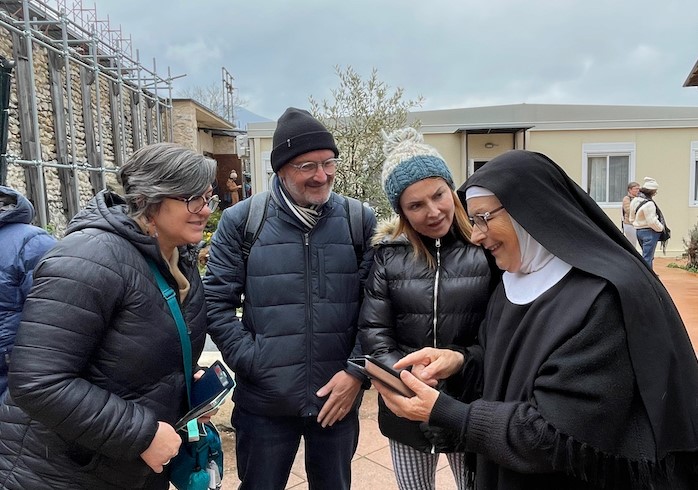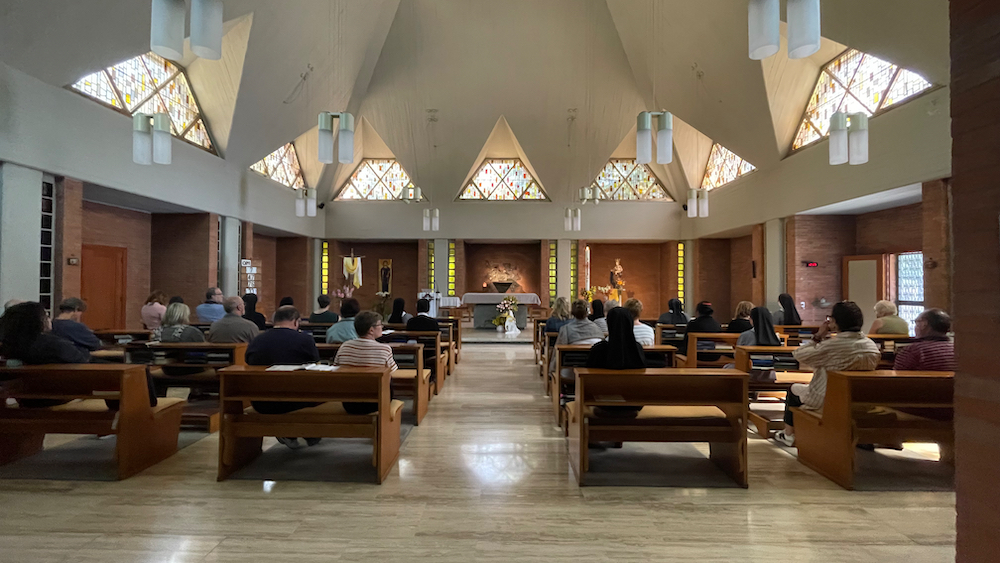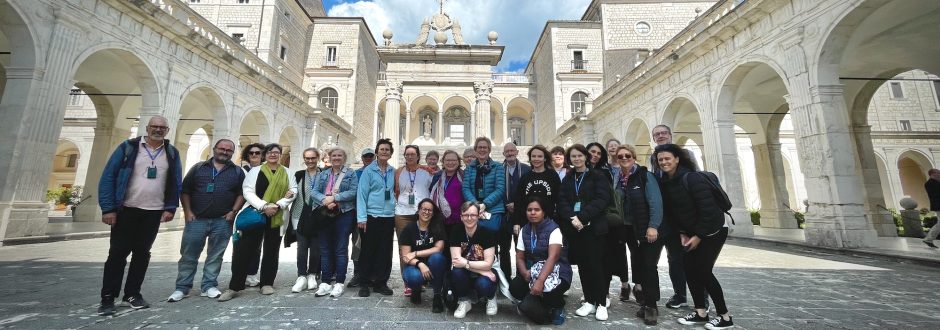Last month, the first post-COVID Good Samaritan Education Benedictine Pilgrimage took up the path of Benedict, Scholastica and Polding across the United Kingdom and Italy. Several pilgrims share their experiences.
Journeying in ‘communio’
by Natasha O’Donoghue, GSE Governing Council Member
At the outset of the 2023 Benedictine Pilgrimage, most of us were not acquainted with more than a couple of other pilgrims. However, our shared affiliation with Good Samaritan Education provided a solid basis for us to journey together in ‘communio’.
During the preparation weekend, our leaders emphasised that pilgrimage was a time of transformation. They introduced the concept of ‘sandpaper living’, that is, the notion that pilgrimage pushes and challenges us to step out of our comfort zones and venture into new territories. In my case, this truly characterised my experience of ‘communio’ on the pilgrimage.
Initially, we were all on our best behaviour, but as we spent more time together, especially in prayer, our façade began to disintegrate, and our authentic selves started to emerge. We started to uncover ‘the beautiful truth’ about each other and supported each other during times when we were not at our best.
The companionship and solidarity of my fellow pilgrims were highlights of the pilgrimage for me. I cherished their company, and we shared many laughs. I felt included and listened to. We were unified in our purpose and were eager to learn everything we could about Benedict and Scholastica. There was a palpable sense of enthusiasm among us to embrace the ‘missionary zeal’ of John Bede Polding and the early Benedictine communities.

Mother Caterina of St Antonio Monastery at Norcia shares stories of the birthplace of Sts Benedict and Scholastica. Image: Good Samaritan Education.
Receiving Benedictine hospitality ‘Receive all as Christ’
by Jane McDonald, Dean of Mission, St Mary Star of the Sea College
We gathered in the guest accommodation kitchen, tired from a long flight and not knowing what to expect. From the moment Father Kevin Hayden OSB welcomed us to Ampleforth Abbey in North Yorkshire with his beaming smile and inviting words, I breathed a sigh of peace as I knew we were in a very special place.
The hospitality of the Benedictine monks permeated our days, not only in the provision of meals, but including a visit to Ampleforth College, not rushed, and most attentive to us as visitors.
Similarly, our welcome into the choir stalls for Lauds and Vespers was clearly an expression of spiritual hospitality, which we relished. Despite some challenges with Latin, the chants were evocative and beautiful and one could not but feel elevated with the whole of humanity in praise of God and for the wonders we could see in each other on pilgrimage.
The hospitality at Ampleforth brought alive for me the words from the Rule of Benedict and a commitment to ponder these further in my own life and work.
Ora et Labora – balancing the Tourist and the Pilgrim
by Alan Ibbett, Board Member, Mater Dei
Balance is important in every aspect of life, especially on pilgrimage. There is so much to see and do; every abbey and church we visited was a masterpiece of engineering, construction, art and devotion. So how do we manage to balance between being a pilgrim and being a tourist?
Beginning with regular prayer, we slow down and really appreciate what we are seeing, not just look at it. Our pilgrimage began at Ampleforth Abbey in the countryside of Yorkshire. Slowing down in this environment was inevitable and a blessing.
Next, welcome the silence – it is difficult to believe, but not every moment needs to be filled. The common feature of the places visited on the pilgrimage was the ability to find silence. In the abbeys in England, the silence was built in, but even in the chaos and clatter of Rome, I found it possible to find silence in the catacombs or even a busy church.
Finally, we can enter the moment and be at one with the experience. By embracing the moment with prayer and silence, knowing when you are a pilgrim and when you are a tourist becomes much easier. So when visiting Subiaco and the cave St Benedict lived in, a perfect balance between tourism and pilgrimage was possible.
On pilgrimage, at first, you will be out of balance. I know I was, maybe more of a tourist than a pilgrim, it is difficult not to be because humans are such looky-loos at heart. So on any journey, when plans change, roadworks don’t get finished in time, where a tourist may be frustrated and angry, a pilgrim accepts the challenge and overcomes it.
Ora et Labora, the balance, is as important to the modern pilgrim as it was to those who have gone before, and thanks to this pilgrimage I was able to find that balance and reconnect.

Pilgrims concluded their pilgrimage with prayer and reflection time with a visit to the Generalate of the Benedictine Sisters of Tutzing, Casa Santo Spiritu, on the outskirts of Rome. Image: Good Samaritan Education.
On return from the pilgrimage life is seen with different eyes, nothing will ever be quite the same
By Iris Nastasi, Principal, Rosebank College
We learnt that Benedictine could take many forms and can be expressed in many ways. We learnt that the communities who embrace change, who seek a future in innovation, will likely survive and thrive. We considered our place in that world, reflected on our own experiences, born in our own context, and pondered the possibilities of our future.
For me, far more moving than the architectural magnificence we viewed, far more powerful, was the landscape and nature in which the abbeys were built.
Windows. I realised that I preferred to look out from the buildings we visited rather than look at the buildings themselves. It was always the view that captured me, as I imagined those who stood a long time before me, appreciating the same view, the same God-given masterpieces of nature. We might try, but we will never be able to match the infinite power and glory of our creator. The windows from Montecassino confirmed this like no other place.
A flawed vision? We heard that English Benedictines perceived Archbishop Polding’s achievements as a disappointment, not true to their original plan. Yet, the magic for me was that Polding established the Sisters of the Good Samaritan.
Here we can see the Benedictine tradition become active and translated into the hard work and prayer that met the people of the church where they stood, dirty, miserable, lonely and often without hope.
Sisters, who could translate the hands of Christ, who supported the destitute, the lonely, the poor, the downtrodden and the abused. They captured the hearts and souls of many. Polding may have been described as lofty, but the missing piece was the Sisters.
The Sisters are Good Samaritan and indeed the Benedictine community now at Jamberoo is testament to his vision and so are we. I wonder what Archbishop Polding would have thought of us all sitting in Douai, marvelling at his vision and courage.
It makes the cemetery at Rosebank even more special. I often stand there and imagine these amazing women who would have pondered and tackled the pressures of their time. I try to appreciate the sacrifices they made so far away from their families, their complete surrender to their faith and love of Christ.
This article was published in the May 2023 edition of The Good Oil.


